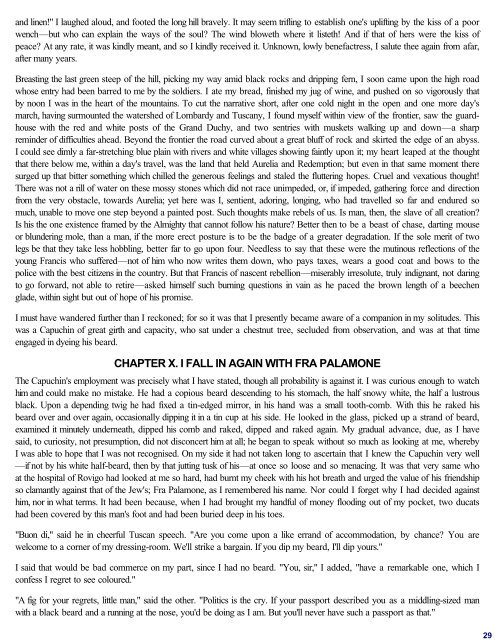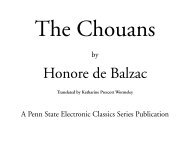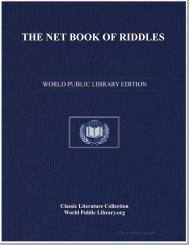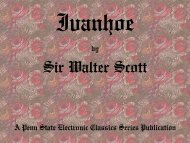THE FOOL ERRANT - World eBook Library - World Public Library
THE FOOL ERRANT - World eBook Library - World Public Library
THE FOOL ERRANT - World eBook Library - World Public Library
Create successful ePaper yourself
Turn your PDF publications into a flip-book with our unique Google optimized e-Paper software.
and linen!" I laughed aloud, and footed the long hill bravely. It may seem trifling to establish one's uplifting by the kiss of a poor<br />
wench—but who can explain the ways of the soul? The wind bloweth where it listeth! And if that of hers were the kiss of<br />
peace? At any rate, it was kindly meant, and so I kindly received it. Unknown, lowly benefactress, I salute thee again from afar,<br />
after many years.<br />
Breasting the last green steep of the hill, picking my way amid black rocks and dripping fern, I soon came upon the high road<br />
whose entry had been barred to me by the soldiers. I ate my bread, finished my jug of wine, and pushed on so vigorously that<br />
by noon I was in the heart of the mountains. To cut the narrative short, after one cold night in the open and one more day's<br />
march, having surmounted the watershed of Lombardy and Tuscany, I found myself within view of the frontier, saw the guardhouse<br />
with the red and white posts of the Grand Duchy, and two sentries with muskets walking up and down—a sharp<br />
reminder of difficulties ahead. Beyond the frontier the road curved about a great bluff of rock and skirted the edge of an abyss.<br />
I could see dimly a far-stretching blue plain with rivers and white villages showing faintly upon it; my heart leaped at the thought<br />
that there below me, within a day's travel, was the land that held Aurelia and Redemption; but even in that same moment there<br />
surged up that bitter something which chilled the generous feelings and staled the fluttering hopes. Cruel and vexatious thought!<br />
There was not a rill of water on these mossy stones which did not race unimpeded, or, if impeded, gathering force and direction<br />
from the very obstacle, towards Aurelia; yet here was I, sentient, adoring, longing, who had travelled so far and endured so<br />
much, unable to move one step beyond a painted post. Such thoughts make rebels of us. Is man, then, the slave of all creation?<br />
Is his the one existence framed by the Almighty that cannot follow his nature? Better then to be a beast of chase, darting mouse<br />
or blundering mole, than a man, if the more erect posture is to be the badge of a greater degradation. If the sole merit of two<br />
legs be that they take less hobbling, better far to go upon four. Needless to say that these were the mutinous reflections of the<br />
young Francis who suffered—not of him who now writes them down, who pays taxes, wears a good coat and bows to the<br />
police with the best citizens in the country. But that Francis of nascent rebellion—miserably irresolute, truly indignant, not daring<br />
to go forward, not able to retire—asked himself such burning questions in vain as he paced the brown length of a beechen<br />
glade, within sight but out of hope of his promise.<br />
I must have wandered further than I reckoned; for so it was that I presently became aware of a companion in my solitudes. This<br />
was a Capuchin of great girth and capacity, who sat under a chestnut tree, secluded from observation, and was at that time<br />
engaged in dyeing his beard.<br />
CHAPTER X. I FALL IN AGAIN WITH FRA PALAMONE<br />
The Capuchin's employment was precisely what I have stated, though all probability is against it. I was curious enough to watch<br />
him and could make no mistake. He had a copious beard descending to his stomach, the half snowy white, the half a lustrous<br />
black. Upon a depending twig he had fixed a tin-edged mirror, in his hand was a small tooth-comb. With this he raked his<br />
beard over and over again, occasionally dipping it in a tin cup at his side. He looked in the glass, picked up a strand of beard,<br />
examined it minutely underneath, dipped his comb and raked, dipped and raked again. My gradual advance, due, as I have<br />
said, to curiosity, not presumption, did not disconcert him at all; he began to speak without so much as looking at me, whereby<br />
I was able to hope that I was not recognised. On my side it had not taken long to ascertain that I knew the Capuchin very well<br />
—if not by his white half-beard, then by that jutting tusk of his—at once so loose and so menacing. It was that very same who<br />
at the hospital of Rovigo had looked at me so hard, had burnt my cheek with his hot breath and urged the value of his friendship<br />
so clamantly against that of the Jew's; Fra Palamone, as I remembered his name. Nor could I forget why I had decided against<br />
him, nor in what terms. It had been because, when I had brought my handful of money flooding out of my pocket, two ducats<br />
had been covered by this man's foot and had been buried deep in his toes.<br />
"Buon di," said he in cheerful Tuscan speech. "Are you come upon a like errand of accommodation, by chance? You are<br />
welcome to a corner of my dressing-room. We'll strike a bargain. If you dip my beard, I'll dip yours."<br />
I said that would be bad commerce on my part, since I had no beard. "You, sir," I added, "have a remarkable one, which I<br />
confess I regret to see coloured."<br />
"A fig for your regrets, little man," said the other. "Politics is the cry. If your passport described you as a middling-sized man<br />
with a black beard and a running at the nose, you'd be doing as I am. But you'll never have such a passport as that."<br />
29















